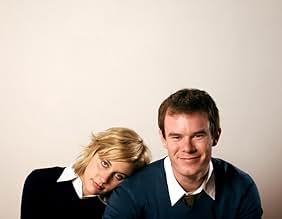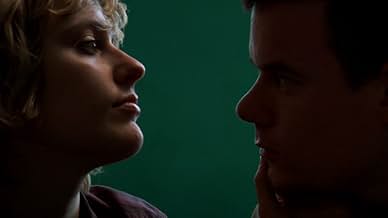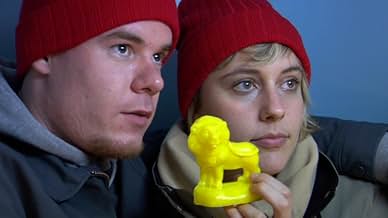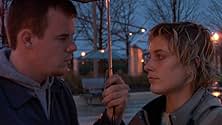Un hombre y una mujer deben lidiar con la tensión que se acumula entre ellos durante una relación a larga distancia.Un hombre y una mujer deben lidiar con la tensión que se acumula entre ellos durante una relación a larga distancia.Un hombre y una mujer deben lidiar con la tensión que se acumula entre ellos durante una relación a larga distancia.
- Dirección
- Guionistas
- Elenco
- Premios
- 2 nominaciones en total
- Dirección
- Guionistas
- Todo el elenco y el equipo
- Producción, taquilla y más en IMDbPro
Opiniones destacadas
Mattie (Greta Gerwig) and James (Joe Swanberg) are a struggling loving couple in Chicago. They break up and a year later, he calls her out of the blue. He has attained some success and she lives in New York. He is the subject of a photo shoot and the photographer even brings her into the picture. They try to reignite their relationship.
This is a mumblecore indie. It's not that much written. The dialog is almost improvisational in its nature. The shooting style is strictly amateur indie. Swanberg plays it stiff initially as the foundational piece of the relationship. Gerwig brings an energy and charisma. Apparently, the film was shoot in two parts just like the on-screen relationship. There is a change in the characters especially Swanberg. He's more confident in the second part. This is a great introduction to two indie careers.
This is a mumblecore indie. It's not that much written. The dialog is almost improvisational in its nature. The shooting style is strictly amateur indie. Swanberg plays it stiff initially as the foundational piece of the relationship. Gerwig brings an energy and charisma. Apparently, the film was shoot in two parts just like the on-screen relationship. There is a change in the characters especially Swanberg. He's more confident in the second part. This is a great introduction to two indie careers.
This mumblecore drama is shot in the style of a homemade movie and takes a close (at times too close) look at Mattie, who resides in The City That Never Sleeps, and James, who resides in The Windy City, a fun-loving, hot and heavy young couple and the severe strain they face while trying to hold onto their passionate but unsustainable long-distance relationship. Will they prevail, or is their steamy love affair already kaput? The low-budget filmmaking style does create a welcomed sense of spontaneity that makes the characters and dialogue feel authentic, plus it really allows the two central actors to embody most of the awkwardness and complexities between the two of them, but still it's not very deep or profound, nor does it have a true plot to propel the scenes forward, thus making it feel like a prolonged and gratuitous exercise despite the relatively short running time. **
The name itself of this school of film-making, "mumblecore," is so despised, the Voice writer, Nick Pinkerton, refused to use it in reviewing this movie and substituted "postgraduate naturalism." That, too, is a put-down ; it suggests mature work is yet to come. But I think maybe we should take this stuff on its own merits and give it credit for being expressive and representative and something new and different, even if it pales in comparison to great cinema. What doesn't? Yes, it's youthful, and in some ways unambitious. Isn't that an expression of the zeitgeist? It is valid in its own way and this is a good example of it, unlike others.
'Night and Weekends' purports to depict in a naturalistic but highly selective style a year and a half of the long-distance relationship of a semi-fictional 20-something couple. They are James and Mattie, and they are played by the filmmakers, Joe Swanberg and Greta Gerwig, respectively.
Reading reviews of this movie when you're wondering if you want to see it can be horrifying. Some of the notices are favorable and even affectionate, but the many that aren't are absolutely excoriating. One enters the auditorium with grave doubts. But in hindsight it's almost encouraging the way the critics attack the protagonists as people, finding them jejune, self-absorbed, uninteresting, etc. Whether that means Swanberg and Gerwig have put it across--or only that nobody believes in the fiction that they're being anyone but just themselves--may not even mater. But such reactions show how difficult it is for some to judge such a film. 'Nights and Weekends' is neither documentary nor fiction, nor yet quite a clever blending of the two. There's hardly much detachment when two filmmakers are shooting themselves up close almost exclusively in relation to each other. They're guilty of intimacy, even if it's staged. They're guilty of taking a long look at themselves, even though they scarcely know who they are. But where this movie succeeds is in evanescent moments of raw, scarcely defined feeling.
Some of the other films of this school feature more numerous casts of less good-looking people and more talk. Swanberg and Gerwig are a presentable couple, depicted in bright color with good lighting. In this not unpleasant but not very atmospheric format the movie shows their out of town sojourns, sex, posing in mirrors, experimentation with a pay photo booth--and their conversations, which, judged by literary standards appear to involve a range of ideas from A to B and a 200-word vocabulary. He's tall, solid, puckish, chin-whiskered; she's a cute, insecure bottle blond with a nice smile and tons of self-absorption to go with her occupation: writer. Together, with minimal narrative and limited dialogue, their surfaces depict them as a life-size Ken and Barbie who talk like young 21st century white middle class Americans. He has designed some kind of video game software that's depicted as having a good future.
Clearly Swanberg and Gerwig have something going on that's not acting. They do a lot of kissing; his is particularly sweet and spontaneous. And they do some screwing, which is more spontaneous than erotic. But they've made a movie out of this. It's not "them." Is the pouting and fighting? Are the filmmakers a real couple--or former couple? Is the real couple's relationship ending, or is this a foreshadowing of its ending, a 'what if'? But the encounters aren't intense enough to make one worry one way or the other. And that's okay, because what one gets is contemporary relationship texture. The feel of the everyday.
How "real" and how invented the scenes are is unknowable. The movie opens with apparently successful sex when she arrives in Chicago (they strip each other fast on the floor; he's visibly aroused). At the end they're in his hotel room in Manhattan where he's come for some kind of job thing and the sex fizzles. Scenes fade to voice-over, cut to slip forward in time to a new place and time and obviously the cutting governs the audience's sense of the relationship and the people.
Critics have found this effort notably unworthy of comparison with Cassavetes. But Cassavetes' naturalistic, improvised classics, with their much more elaborate narratives and back-stories and their much more self-conscious and actor-y performances, are something entirely different anyway. 'Nights and Weekends' has qualities other films don't have. But they also have none of the poetry and cinema allusion of the Nouvelle Vague, nor the control and elegance of true minimalism: this time cutting doesn't mean calculation, structure, hardly even editing, though it does mean controlling what we get to see of the couple's interactions.
And maybe what they all mean is this:
The relationship won't last. As Mattie says in one speech, they have to do something. She doesn't say it, but one of them must move. Since he has business in New York, that might be Joe. But since things go awkwardly on their last, New York, meeting, maybe it's just going to end. The ending leaves us hanging. It's just another raw cut. No poetry, no finality, just a few tears.
Yet some viewers when I attended were audibly very pleased and found much of the happenings on screen funny and true.
My first reaction with mumblecore is a sigh of relief--it's not so bad; it could have been worse. Cassavetes' films, however much richer, can be tedious and painful watching and nothing seems more theatrical than actors being naturalistic. Swanberg and Gerwig are scarcely actors. They're just two people good at ignoring the camera even when it's right in their faces. They're more like 'models,' which is what porn filmmakers call their actors. Reservations and condescension aside, though, this movie conveys some of the most raw and essential aspects of living in a long-distance relationship that I've ever seen. Ken and Barbie are an Everyman and Everywoman for this painful and and frustrating and sometimes beautiful experience.
'Night and Weekends' purports to depict in a naturalistic but highly selective style a year and a half of the long-distance relationship of a semi-fictional 20-something couple. They are James and Mattie, and they are played by the filmmakers, Joe Swanberg and Greta Gerwig, respectively.
Reading reviews of this movie when you're wondering if you want to see it can be horrifying. Some of the notices are favorable and even affectionate, but the many that aren't are absolutely excoriating. One enters the auditorium with grave doubts. But in hindsight it's almost encouraging the way the critics attack the protagonists as people, finding them jejune, self-absorbed, uninteresting, etc. Whether that means Swanberg and Gerwig have put it across--or only that nobody believes in the fiction that they're being anyone but just themselves--may not even mater. But such reactions show how difficult it is for some to judge such a film. 'Nights and Weekends' is neither documentary nor fiction, nor yet quite a clever blending of the two. There's hardly much detachment when two filmmakers are shooting themselves up close almost exclusively in relation to each other. They're guilty of intimacy, even if it's staged. They're guilty of taking a long look at themselves, even though they scarcely know who they are. But where this movie succeeds is in evanescent moments of raw, scarcely defined feeling.
Some of the other films of this school feature more numerous casts of less good-looking people and more talk. Swanberg and Gerwig are a presentable couple, depicted in bright color with good lighting. In this not unpleasant but not very atmospheric format the movie shows their out of town sojourns, sex, posing in mirrors, experimentation with a pay photo booth--and their conversations, which, judged by literary standards appear to involve a range of ideas from A to B and a 200-word vocabulary. He's tall, solid, puckish, chin-whiskered; she's a cute, insecure bottle blond with a nice smile and tons of self-absorption to go with her occupation: writer. Together, with minimal narrative and limited dialogue, their surfaces depict them as a life-size Ken and Barbie who talk like young 21st century white middle class Americans. He has designed some kind of video game software that's depicted as having a good future.
Clearly Swanberg and Gerwig have something going on that's not acting. They do a lot of kissing; his is particularly sweet and spontaneous. And they do some screwing, which is more spontaneous than erotic. But they've made a movie out of this. It's not "them." Is the pouting and fighting? Are the filmmakers a real couple--or former couple? Is the real couple's relationship ending, or is this a foreshadowing of its ending, a 'what if'? But the encounters aren't intense enough to make one worry one way or the other. And that's okay, because what one gets is contemporary relationship texture. The feel of the everyday.
How "real" and how invented the scenes are is unknowable. The movie opens with apparently successful sex when she arrives in Chicago (they strip each other fast on the floor; he's visibly aroused). At the end they're in his hotel room in Manhattan where he's come for some kind of job thing and the sex fizzles. Scenes fade to voice-over, cut to slip forward in time to a new place and time and obviously the cutting governs the audience's sense of the relationship and the people.
Critics have found this effort notably unworthy of comparison with Cassavetes. But Cassavetes' naturalistic, improvised classics, with their much more elaborate narratives and back-stories and their much more self-conscious and actor-y performances, are something entirely different anyway. 'Nights and Weekends' has qualities other films don't have. But they also have none of the poetry and cinema allusion of the Nouvelle Vague, nor the control and elegance of true minimalism: this time cutting doesn't mean calculation, structure, hardly even editing, though it does mean controlling what we get to see of the couple's interactions.
And maybe what they all mean is this:
The relationship won't last. As Mattie says in one speech, they have to do something. She doesn't say it, but one of them must move. Since he has business in New York, that might be Joe. But since things go awkwardly on their last, New York, meeting, maybe it's just going to end. The ending leaves us hanging. It's just another raw cut. No poetry, no finality, just a few tears.
Yet some viewers when I attended were audibly very pleased and found much of the happenings on screen funny and true.
My first reaction with mumblecore is a sigh of relief--it's not so bad; it could have been worse. Cassavetes' films, however much richer, can be tedious and painful watching and nothing seems more theatrical than actors being naturalistic. Swanberg and Gerwig are scarcely actors. They're just two people good at ignoring the camera even when it's right in their faces. They're more like 'models,' which is what porn filmmakers call their actors. Reservations and condescension aside, though, this movie conveys some of the most raw and essential aspects of living in a long-distance relationship that I've ever seen. Ken and Barbie are an Everyman and Everywoman for this painful and and frustrating and sometimes beautiful experience.
This is first mumblecore I've seen and I must say that I don't know why some people are so excited about it. Swanberg's movie is just a compilation of less or more boring scenes in which director and his star, Great Gerwig are talking, laying in bed, trying to make love and so on, so on. It's not that the whole thing is bad - it just leads to nowhere. There is no plot, there is no hidden message. The acting is quite good, especially Gerwig is doing nice job in here - she's very natural and has her own charm. Also photography and editing are better than I expected, being aware of that the film is practically non-budget. So - technically work is made unobjectionable, but the rest - the plot, tension, action - it just doesn't exist in this one. Maybe for few viewers it's kind of art. Not for me.
Some time ago I gave up on Swanberg. He can do a 20 minutes story well. When it comes to 90 minutes, it's the same 20 minutes and a lot of air.
Gerwig is nice. She acts well. But there is not much of a story she can work on. In fact, there is no story, only a chronological succession of snapshots that start nowhere and end up somewhere.
Gerwig is nice. She acts well. But there is not much of a story she can work on. In fact, there is no story, only a chronological succession of snapshots that start nowhere and end up somewhere.
¿Sabías que…?
- TriviaGreta Gerwig admitted in interviews that the film was a difficult experience for her. Gerwig indicates that she and Joe Swanberg got into a number of quarrels over the film and did not speak to each other for three months. In fact, during production, the entire tone of the film shifted from the original plan of making a "happy" film to something much more complicated.
- ConexionesReferenced in Diminishing Returns: Oscars 2020 (2020)
Selecciones populares
Inicia sesión para calificar y agrega a la lista de videos para obtener recomendaciones personalizadas
- How long is Nights and Weekends?Con tecnología de Alexa
Detalles
Taquilla
- Total en EE. UU. y Canadá
- USD 5,430
- Fin de semana de estreno en EE. UU. y Canadá
- USD 2,902
- 12 oct 2008
- Total a nivel mundial
- USD 5,430
- Tiempo de ejecución1 hora 20 minutos
- Color
- Mezcla de sonido
- Relación de aspecto
- 1.85 : 1
Contribuir a esta página
Sugiere una edición o agrega el contenido que falta

Principales brechas de datos
What is the French language plot outline for Nights and Weekends (2008)?
Responda




















